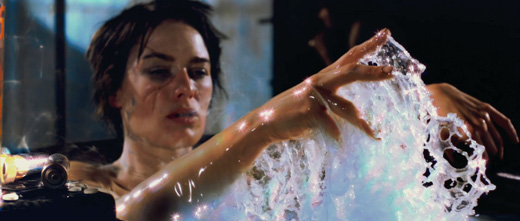
Written by Alex Garland
Directed by Pete Travis
USA/UK/India, 2012
Excluding a much-maligned 1995 adaptation, one of the more notable influences 2000 AD’s Judge Dredd comic book series has had on the film world is informing Paul Verhoeven’s RoboCop. Both have corrupt future city settings, helmeted law enforcer protagonists, and often absurd levels of violence. The comparison in Pete Travis’ Dredd is especially inescapable when, in one scene, Karl Urban’s Judge Dredd informs a felon that they only have a certain number of seconds to comply. The most important comparison, however, between RoboCop – or even Paul Verhoeven’s sci-fi fare in general – and the Judge Dredd comics is the heavily satirical content amidst the gore and gunplay. Though not a glaring detriment, it is somewhat disappointing that Travis’ film only has small flourishes of the satire, especially as one brief example in the film’s opening sequence is something one suspects Verhoeven would relish: following a crime bust in a public venue, a street-cleaning vehicle wipes up the blood of murdered bystanders while the bodies in question are still on the ground, as a nearby display assures customers and staff that they will be able to re-enter the building in just a few minutes.
With both films sharing a law force trapped in a tower block-based siege, the Judge Dredd reboot bears some superficial similarities to The Raid. While Gareth Evans’ film had some John Carpenter DNA mixed with the better traits of prime John Woo, the Carpenter influence is even more pronounced in Travis’ effort. Dredd is a concise genre exercise with sharply-defined, engaging characters, a compelling narrative, and moments of inspired flair in its bursts of action. Some of the less oppressive portions of Paul Leonard-Morgan’s effective industrial score even bring to mind Carpenter’s self-composed synth soundtracks. Like that director in his prime, Travis and writer Alex Garland are just concerned with a singular showcase of thrills, the film never overstaying its welcome, length or narrative-wise, and displaying little to no concern with franchise aspirations. In a comic adaptation market flooded with intertwining films, bloated allegorical contortions and constant set-up for sequels, Dredd is positively refreshing.
Also a nice change of pace for these adaptations is an aversion from the increasingly tired format of origin stories. Garland’s effectively trim scripting is low on expository dialogue, the film starting with a short and sweet description of the dystopian setting but leaving much of the world-building down to visual storytelling and character observations. (Shot in South Africa, the reasonably low-budget feature, in comparison to DC and Marvel products, makes good use of a relatively recognisable world in its exterior scenes, though wisely avoiding metaphorical reflections on actual reality.) This approach is befitting of its lead, too, as the whole point of Judge Dredd – the Judges being the figures that police the city but also pass sentence and enforce punishment while on the streets – is that he isn’t a person prone to introspection or elaborate explanations. He has no illusions about his role’s futility; Olivia Thirlby’s psychic new recruit presents the conflict of optimistic faith in at least some people relegated to the crime-ridden slums. If Dredd, as he at one point snarls at the film’s antagonists, is the law, Thirlby’s Cassandra Anderson is a better representation of the middle part of the enforcers’ “Judge, Jury, Executioner” mantra.
The journey of these characters is not especially innovative, but it is extremely well-realised and interesting, aided by game performances from its cast. Karl Urban is a delight as an embodiment of gruff sardonicism, while the likeable Thirlby excels with her character’s mix of toughness and vulnerability. Lena Headey’s sadistic villain Ma-Ma is another highlight, the actress providing slinky, disquieting menace to a drug lord part that admittedly involves little face-to-face contact with her Judge targets. Her side includes fine support from Wood Harris and the increasingly reliable Domnhall Gleeson.
Ma-Ma rules over the tower block known as Peach Trees, which harbours the production of Slo-Mo, a drug that radically reduces the speed of time for its partakers. It is through this device that the film has perhaps the most effective mainstream cinema usage of slow motion in years. Dredd’s cinematographer is Anthony Dod Mantle, the man who shot Lars von Trier’s Antichrist, and that film’s prologue is strongly recalled by Dredd’s scenes of unlucky individuals plummeting to their demise from a 200-storey height, all while their brain’s perception of events is reduced to a tiny percentage of the time the fall actually takes. It’s a nasty, horrifying concept, and the slowed-down splatter effects are especially well-served by the supplementary 3D and the score, which gives the grimness a strangely lyrical quality. Dredd’s thrills as a whole aren’t reliant on genre oddities, but the strange subversions like this are also welcome highlights.
Josh Slater-Williams



